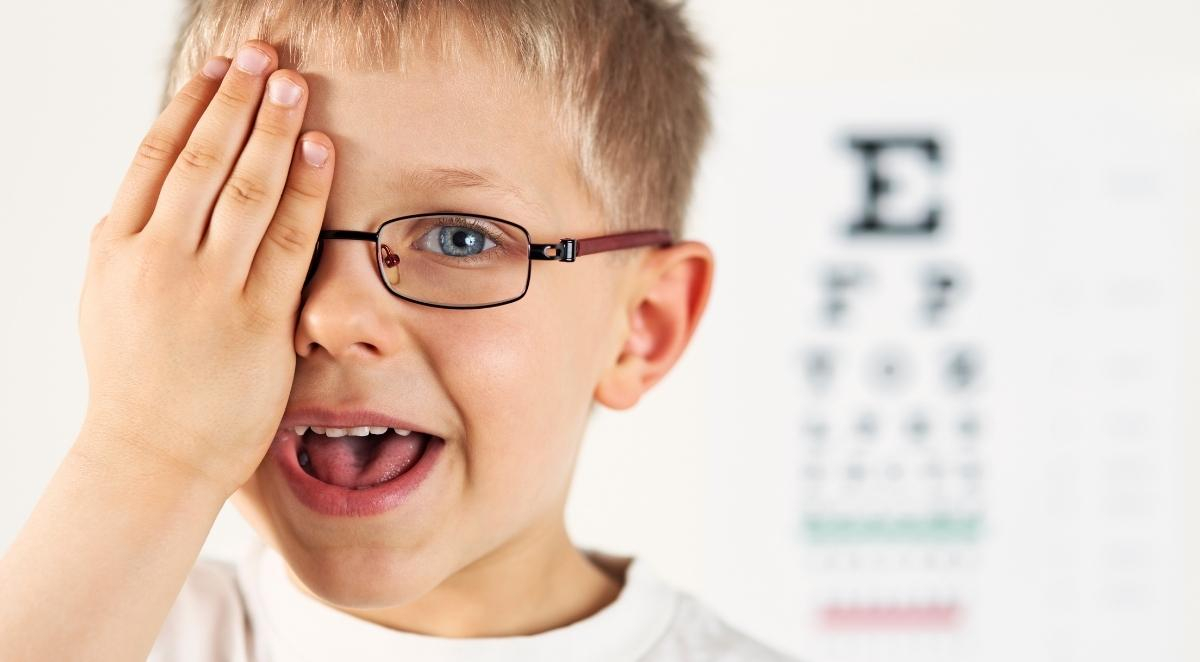How to Tell If My Child Needs Glasses
Most kids with good eyesight will occasionally have at least one of the symptoms below as they grow. If you notice combinations of any of the following, it may be a symptom indicating your child may have eyesight problems and need glasses:
- Squinting when trying to focus on objects that are far away can be a sign of myopia or nearsightedness.
- Frequent headaches or nausea in some cases when focusing on close objects for extended periods of time. If headaches occur after time outside or when around bright lights, it can be a symptom of light sensitivity.
- Covering one eye when reading a book or watching TV can be a sign of coping with vision problems.
- Difficulty reading, such as losing a place on the page and skipping lines when reading, might indicate astigmatism or strabismus(crossed eyes).
- Clumsiness marked by frequent tripping and bumping into objects after they have fully learned to walk can be a general indication of problems with eyesight and depth perception.
- Eye rubbing or redness can be a sign of dry eyes, allergies or an eye disease called keratoconus.
- Sitting too close to screens or books is a way to cope with nearsightedness.
If you notice a number of these symptoms frequently or your general pediatrician has concerns, it is probably time to schedule an appointment for an eye exam with your local eye doctor. Regardless of whether any of these symptoms are noted, all children should have a full comprehensive eye examination before starting school and then yearly afterwards.
Why Eye Care for Children Is Important
It is essential to pay attention to your child's vision because one of the most significant impacts it can have is on learning. A substantial amount of the learning process for your child involves their eyes. Scheduling a back-to-school eye exam may help prevent frustration for you and your child by removing barriers that neither of you could see, (pun intended) allowing them to excel in the way you know they can.
Frustration at their ability to learn or focus on activities can often be mistaken for boredom with school, ADHD, or just “kids being kids,” which can compound destructive behaviors when frustrations aren’t being meaningfully addressed.
Young children, even teenagers, may not know how to communicate issues with their vision, or they might not even realize that they are experiencing complications with their eyes.
If you have a child who has already been diagnosed with vision problems and who wears glasses or contacts, it is still essential to have a yearly exam; as children mature and grow, their eyesight changes as well. Back-to-school eye exams are a great idea to make sure they are prepared for the year ahead.
Helping Younger Kids Adapt to Glasses
Most common vision problems in children can be corrected with corrective lenses, most often glasses, until they grow into the ability to wear contacts. But it can often be difficult to convince kids to do or wear anything they aren’t thrilled about, even if it will make life easier for them.
If you find yourself having trouble getting your child to consistently wear glasses pay special attention to trying the following. They don’t necessarily have to love it but help them be comfortable.
- Find a pair that fits: You will want to select a pair of glasses that is incredibly durable to prevent scratches and breaking, as well as fit their facial structure. The closer it is to feeling like they aren’t wearing anything, the more likely they are to wear them!
- Let them help pick: Glasses come in a wide variety of frame styles and colors; let them participate in picking the frame they want.
- Incorporate it into a routine: Start working glasses and their care into morning and nightly routines. Keep them close to put on in the morning, and include them in other checklists for getting ready, and when going to bed for the day.
- Keep it fun: Bolster your kid's confidence with a compliment or two, give cool examples of famous people or favorite characters who wear glasses, and gamify wearing them as an incentive to help form good habits.
- Be patient: Getting used to glasses takes time, be patient as they adapt to the change. The attitude you show is the one they will adopt.
It is a difficult adjustment; if you want, you can read more about our tips for helping your child love wearing glasses.
Finding an Optometrist
When it comes to our health, and especially that of our children, finding a reliable and trusted doctor is essential. At Asheville Vision and Wellness, we are passionate about helping people understand how overall nutrition and health impact vision. As part of your child’s eye exam, we will recommend steps to take to improve your child’s nutrition and eye health.
Our optometrists and opticians are trained to deliver the perfect fit and style for our customers’ needs. We can ensure your kid’s prescription is perfect with on-site optical finishing. With a wide array of carried brands, we are sure to find a style that gets them excited to wear their new pair(s) of glasses.
If you think your child may have vision problems or before the school year starts, schedule an eye exam for your children with Asheville Vision and Wellness or contact us. We are your trusted eye doctors in the Asheville area. Serving the Asheville and surrounding western North Carolina area since 1989, Asheville Vision and Wellness is the area’s go-to optometrtist’s office.

